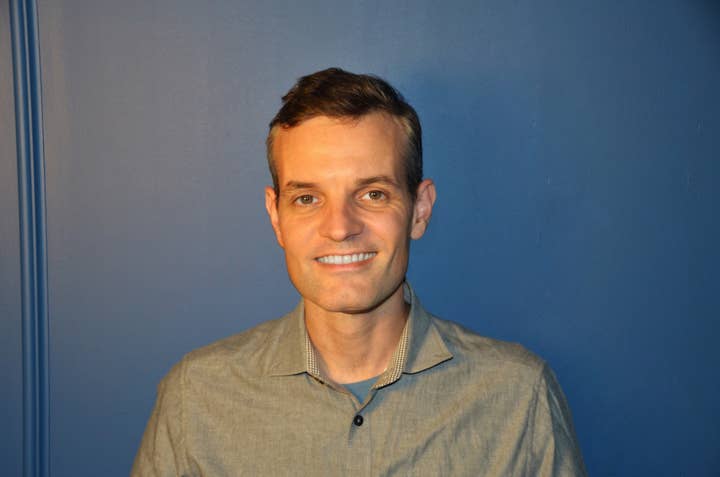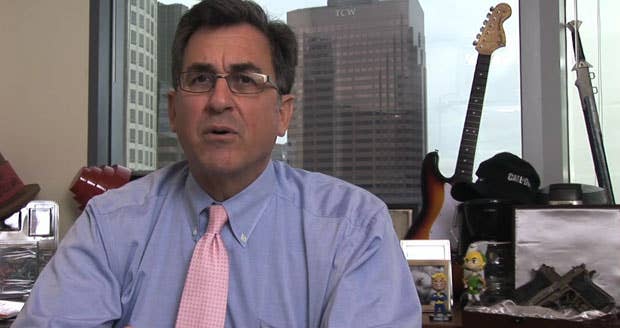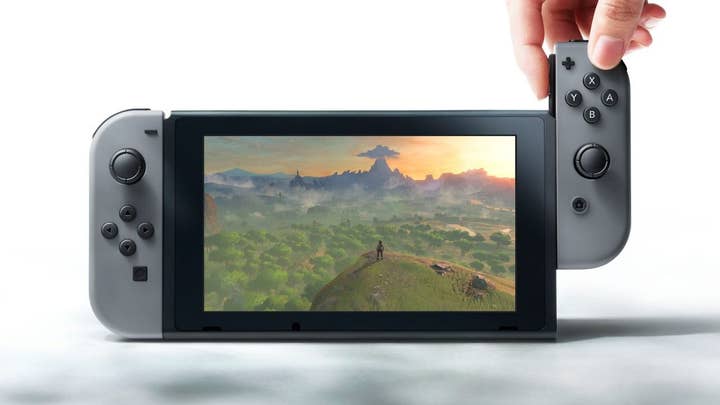What to expect in the games biz for 2017
All eyes are on Nintendo, and can VR finally prove itself? We ask analysts for predictions and offer some of our own
It's hard to believe, but 2016 is quickly coming to an end. It's been a wild year and one full of many interesting developments in the games industry. There are new mid-cycle consoles on the market, VR is desperately trying to get consumers' attention, Nintendo has started to make its mark on mobile and is gearing up to launch the much anticipated Switch, and eSports is growing larger by the day. How will things shape up in 2017?
As we do every year on GamesIndustry.biz, we've invited a few of our favorite industry analysts to provide a summary of their top predictions for the next year (and in some cases evaluate their predictions from the previous year). Joining us in this round are SuperData's Joost van Dreunen, EEDAR's Patrick Walker, IHS Markit's Piers Harding-Rolls, Wedbush Securities' Michael Pachter, and Kantan Games' Dr. Serkan Toto.
Additionally, each member of the GI.biz team has made a prediction for 2017. You can read those at the end of this article.
Joost van Dreunen, SuperData

Mobile gaming will reach $40 billion in worldwide revenues. Traditional publishing houses will drive consumer spending with premium titles and leveraging their intellectual property. Nintendo will manage to normalize a higher price point for mobile games as audiences look for higher quality content, allowing others to follow the example.
eSports will undergo a real stress-test to become a media market as ad budgets grow. The current momentum behind investments in competitive gaming make this market increasingly volatile, forcing teams, platforms, and publishers to deliver on everything they've been promising. Activision Blizzard and Tencent (Riot Games) will generate around $200 million each from selling broadcasting rights. In 2017 I also expect to see an early stage consolidation among tournament organizers as they seek to become more efficient following the recent growth spurt.
VR finds its killer app. If 2016 is the year that consumer-ready VR was born, then 2017 will be the year that it starts teething. We expect to see steady growth of the segment, with HTC and Sony in the lead. Major publishers will continue to abstain from making big bets on VR, allowing a medium-sized studio to jump into the vacuum.
Activision will make $100 million in ad revenue. Publishers will seek to more aggressively monetize the 95% of non-spending players with advertising. Activision is currently experimenting with some of KING Digital's minor titles and will roll this out further mid-2017.
Patrick Walker, EEDAR

VR will have a much better year in 2017. My prediction in this column last year that consumer VR would wow the press but struggle to find mass market appeal was spot on. The VR hype cycle started shortly after the announcement of the PSVR, led to a stream of wildly optimistic (and rapidly shrinking) forecasts in the press, and finally burst after a disappointing holiday. Ironically, I'm much more excited about the chances of mainstream VR in 2017. Broader manufacturer and developer support for the Daydream will push mobile VR, and the first truly must-have content will arrive for high-end VR. For the first time, EEDAR is playing unreleased games through our Game Evaluation service that would make me say "wow, if you're a gamer and can afford it, you need to buy a high-end VR system."
The Switch will start strong, but slowing third-party support will signal a tough road ahead. The success or failure of the Switch won't be determined on launch day, when Nintendo fan passion, planned Nintendo exclusives, and a reasonable price will drive respectable early sales. It will be determined by the ongoing software sales driven by ongoing third-party support. And this depends on whether gamers decide they need a hybrid handheld/console. At EEDAR, we always begin with the question, "would a gamer want to play this type of game on this platform?" Unfortunately, my prediction is that the mainstream market will choose the power of the console for sedentary experiences and the ubiquity of the smartphone for mobile experiences, leaving a hybrid console/handheld underpowered and caught in the middle.
Branded hits are the big story in mobile in 2016. The short term success of these hits will refocus the mobile industry on the pillars of retention, monetization, and portfolio strategy. The success of Pokemon Go is a case study in brand-driven virality, the power of the Clash IP helped turn Clash Royale into an instant hit, and Super Mario Run is racking up millions and millions of downloads. However, these hits also show how challenging long-term success is in mobile. Pokemon Go monthly revenue is declining almost as quickly as it rose, and my prediction that Clash Royale would cannibalize Clash of Clans was met with heavy skepticism but ultimately came true. I predict similar challenges for Super Mario Run. Record first-month downloads and a high conversion rate for mobile will create excitement and headlines, but a premium model on mobile and a genre that is difficult to monetize will lead to a quick realization that the overall revenues will be much lower than other mobile or console market leaders.
This will be the last year that the term "console generation" is appropriate. And this shift will put Microsoft back in the console race. Microsoft is well positioned to take advantage of the mid-generation console releases. The Scorpio's power is necessary for high-end 4K and VR gaming, Microsoft is using cross-platform play to blur the lines between console and the rapidly growing PC market, and Scorpio compatible, third-party VR headsets will be hitting the market at the same time as compelling VR games. I believe the industry is underestimating the disruption potential of a bridge between console and PC gaming, in which an account and a library follows you across devices.
Piers Harding-Rolls, IHS Markit

Overall market performance - IHS Markit is predicting World consumer spending on games to break the $100bn level in 2017 with year-on-year growth of 6%. The games sector continues to be bigger than consumer spending on cinema box office, DVD and Blu-ray disc sales and rentals, online video services, physical music and streaming music services combined. A vast majority of the market growth will come from the games app market, which will allow the mobile device category to accumulate further market share and put considerable distance between itself and second placed PC gaming. China will remain the biggest games market, stretching its market share lead over the USA. We also expect share of total games spend for microtransactions and IAPs to reach 69%, a record for this form of monetisation.
Devices and technology developments - We're forecasting that PS4 will sell over double the number of Xbox Ones in 2017 and that the combined sales volume for both platforms will reach 27 million. We don't expect Microsoft to claw back market share in continental Europe to make this a closer race. We'll have to wait until 2018 before digital spending on TV consoles amounts to more than 50% of the market opportunity representing a watershed moment.
In terms of new console launches, while Nintendo's Switch has been met with a lot of positivity, I'm concerned that the device is quite a complex proposition and does not necessarily align with a broad spectrum of use cases. I hope that the marketing messaging overcomes some of the challenges that were present with the Wii U campaign. We are forecasting around 4 million sales next year but that outlook is open to revision following pricing and content announcements. One factor Nintendo does have in its favour is the halo impact of its smartphone strategy, which will have a positive impact on sales.
While there is a general assumption that Switch lessens the chance of a follow up to the 3DS, I think there is still room for a next-gen handheld device as the two product categories remain different in a number of ways. We could find out more about a new Nintendo handheld in 2017.
With Microsoft's ambition to deliver a native 4K gaming console in Project Scorpio, I think there is a fair chance it won't hit its current release window of the end of 2017 and will instead arrive in 2018. I also expect it to come to market at a price point significantly more than Sony's PS4 Pro. I wouldn't be surprised if Microsoft partnered up with Oculus to deliver Rift support on Project Scorpio, although the likelihood of an exclusive deal has receded with the announcement of a collection of OEM partners for its Windows Holographic strategy.
VR expectation - I think we're on the cusp of a backlash against VR as early experiments in content leave many developers out of pocket. It's inevitable that after so much hype, the consumer VR sector will enter a period of self-reflection as commercial realisation sets in and I think that will hit us more forcefully in 2017. I expect a lot of negative news stories to swirl around the sector; meanwhile installed bases will continue to grow steadily and things will look more positive at the end of 2017. I also expect PlayStation VR to remain supply constrained well into 2017 as factory output slowly catches up with unsatisfied launch demand. However, once again most VR news will be centred on headset technology and not content but this tide will start to turn at the end of the year.
Out of home VR venues, already amounting to over 6,000 in China, will become more commonplace in the US during the year, driven by the IMAX and other deals. Outside of China, I don't expect any major all-in-one VR headset launches in 2017 from the likes of Oculus - we'll be waiting longer for those. I also don't expect Apple to enter the market in 2017.
We'll start to see third-party Google Daydream View headsets in 2017 including launches from Chinese smartphone OEMs with the ambition of building overseas sales for their smartphones and accessing the premium handset market. Still, we'll have to wait until 2018 for Daydream View to outsell Samsung's Gear VR on a world basis.
Michael Pachter, Wedbush Securities

Last year's prediction report card:
Sony will abandon the Vita - A-. It looks like it has been discontinued, but no official announcement. No appearance at E3, either.
Miitomo will be a commercial flop - A+. Not a word on revenue in over a year, and few words about it at all.
Nintendo's second mobile game will be a success, predicted to be a Super Mario platformer-B+. Pokemon Go is not a Nintendo game, but was a huge success. Super Mario Run is its second game (by a hair), and is off to a very good start.
NX will not come in 2016 - A+.
Activision's first joint effort with King will be a Skylanders driving game-Incomplete. We don't know yet, no joint efforts yet.
The Assassin's Creed movie will be a modest success - A. It's looking really good based upon the trailers.
This year:
PS4 price goes to $199. I think Sony is intent upon keeping Microsoft in distant second, and expect a price cut for standard PS4 (slim) to $199 before year-end 2017.
No Rockstar games other than Red Dead Redemption. Rockstar hasn't released a "new" game since 2013, and Red Dead will consume all of its efforts in 2017.
Call of Duty returns to glory with a Modern Warfare title from Sledgehammer. Although I think that they want to establish the Advanced Warfare brand as a franchise, the relatively poor performance of Infinite Warfare suggests to me that Activision has to get its act together and bring fans back into the fold.
Super Mario Run is a huge hit out of the gate, and interest peters out by June. Notwithstanding the brand's popularity, Nintendo is making a strategic error with its "free-to-start" business model, and I expect sales to drop off relatively quickly.
Pokemon Go drops out of the top 10 in every country with a population greater than 20 million. The game was fun, but there's only so many Pokemon to capture.
The Switch is sold out through September. The console looks fun, the price appears to be right, and I expect demand to be high. If there is a lot of third-party support (games, not merely labels), I think demand remains high.
The Xbox Scorpio is priced at $399. This might not be low enough, particularly if PS4 Pro drops before holiday 2017, but Microsoft has to price competitively or fall farther behind.
The next Elder Scrolls installment comes out, the next Half Life installment does not. I think Bethesda is close, and think that Valve is not. However, I'd like to be half wrong on this one.
Dr. Serkan Toto, Kantan Games

2017 will be a critical year for Nintendo
I think that 2017 will be the most critical year for Nintendo in a long, long time.
The Switch is a revolution for the company: it's the first time Nintendo disintegrates the home and portable console audience. Nintendo needs to hit all bases with this device, or they will be in limbo for the next few years on the console front.
I think 2017 will also be the first year that we'll see a big hit on mobile by Nintendo. If executed right (full experience, free-to-play, high quality, strong virality), Animal Crossing could already be that title.
My bet is that despite the Switch launch, Nintendo will make more announcements in terms of mobile games and further usage of the IP (especially movies) in 2017.
Not much will change for Sony vs. Microsoft
I wouldn't expect too many changes in the console hardware space next year. Sony is too far ahead, has the better momentum and generally looks solid with the PS4.
Microsoft will need to make sure Scorpio comes out as soon as possible. The first details point to the device being a real beast, but I think that Sony will be ready when it launches.
VR will continue to drag on
I am a VR fan and believer. However, I think that 2016 was an experimental year for the tech, not an inaugural one. I think that in 2017, VR will still have a hard time establishing itself in the mainstream. My prediction is still no killer game for VR next year.
Mobile will see more consolidation
I think that in 2017 there will be more M&A and more studios disappearing in the mobile game space. There is extreme over-saturation in both the supply and demand side in this market. As mentioned, 2017 could also be the first year Nintendo shows it will be a mobile powerhouse (they will be eventually).
HTML5 games will be more popular
Facebook started Instant Games in beta in 2016, and I think the company will try to emancipate itself from Apple and Google by increasing its support of HTML5 games. This particular industry is further ahead in other, massive gaming markets such as China and Japan, and I believe 2017 could be the year HTML5 gaming breaks into the mainstream in the West, too.
Staff Predictions
The GI.biz team is happy to play the predictions game, too. Here are our quick takes:
James Brightman: After taking a punch to the gut with the cold reception that Wii U received, Nintendo will bounce back in 2017, selling upwards of 15 million units of the new Switch console during its first year. Fueled by Zelda: Breath of the Wild, Mario, Pokemon and improved third-party support, Switch will easily pass Wii U's lifetime sales in its first 12 months on the market alone.
Dan Pearson: Both Sony and Microsoft will continue to push for 4K adoption, but with slow uptake on UHD televisions and an increasing frequency of the sort of performance disparity seen with The Last Guardian, platform fragmentation will become a real issue. In an attempt to draw a line between the platforms, one of the platforms will renege its promise and release a game either exclusively for PS4 Pro/Scorpio, or at least labelled "Made for 4K" or similar. In short, the halfway update cycle is going to get harder before it gets easier.

Matthew Handrahan: After a year of uncertainty in 2016, next year will be one of unambiguous disappointment for VR, specifically the high-end hardware pushed by Oculus, HTC/Valve and Sony. The unique gameplay experiences that so many believe the medium needs to grow in popularity won't emerge in the next 12 months, and the handful that do will be overshadowed by an abundance of product in familiar genres, which will struggle to justify the necessarily high prices. Sales of the Rift, Vive and PSVR will be well below expectations, but we'll be left to speculate on just how far below due to an ongoing absence of hard data from the manufacturers.
Christopher Dring: As the current generation of consoles enters its fourth year, the phrase in the boardrooms of Microsoft and Sony will be 'audience expansion'. Yet with more mainstream consumers (including kids, families and women) increasingly gaming on tablets, smartphones and PCs, it will be an uphill battle to convince them that it's worth investing in a dedicated gaming console - although perhaps Nintendo has the answer.
It won't just be platform holders looking to widen its net, triple-A publishers are faced with the same challenge. As gamers buy fewer big titles and spend longer playing (and investing in) the likes of Overwatch, Destiny, The Division and FIFA, major studios and publishers will start announcing and working on projects designed to appeal to entirely new audiences that perhaps don't want shooters or sports games. Unfortunately, toys-to-life won't be part of this conversation. It'll be all but extinct come next Christmas.
James Batchelor: The relationship between media and the industry continues to change. Despite another YouTube 'scandal' or two (involving undisclosed partnership deals between influencer and publisher, leapt upon by the specialist press but largely ignored or dismissed by audiences), more games firms decide to refrain from sending review copies to traditional sites and magazines while YouTubers and Twitch streamers continue to receive 'preview' copies around the same time. More publishers opt out of attending major trade shows like E3 and Gamescom in favour of hosting their own events and invite more influencers than traditional press. Said press sees further consolidation with the closure of at least one magazine - most likely in the UK after the Future/Imagine merger - and one high-profile site, despite branching into the realm of wider entertainment coverage.
Brendan Sinclair: Maybe this is all the 2016 talking, but I think the industry disappoints slightly in 2017. The maturation of emerging markets and lack of exciting hardware innovations will keep mobile gaming growth in check. VR, AR, and eSports will continue making baby steps, but none will transition from a "future thing" to a "present thing" in 2017. On the console side, I expect Microsoft to have trouble with the marketing message around Scorpio and sentiment surrounding the PS4 Pro will segue from optimism to ambivalence. Nintendo Switch will do better than Wii U, but the company's mobile efforts will fall short of unrealistic expectations raised by Pokemon Go.








